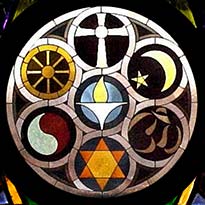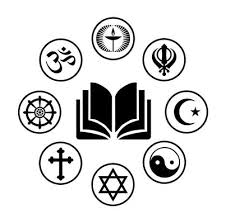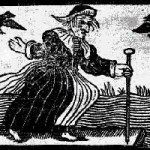 Several years ago I was on a panel with several well known Pagan authors and personalities. There were also several lesser known Pagans there (I was one of them, but I’m great on panels!) too, all in all it had the potential to be a pretty interesting conversation. Like most panels, everyone who was a part of it was nice, nearly to a fault. Every question was treated with a high-degree of seriousness, whether it deserved to be or not.
Several years ago I was on a panel with several well known Pagan authors and personalities. There were also several lesser known Pagans there (I was one of them, but I’m great on panels!) too, all in all it had the potential to be a pretty interesting conversation. Like most panels, everyone who was a part of it was nice, nearly to a fault. Every question was treated with a high-degree of seriousness, whether it deserved to be or not.
At one point we were all asked to define the word “community.” With eight panelists I expected nine different answers, but I was still surprised by many of them. At one point someone began painting the Muslim mosque down the street as a part of some weird extended “Pagan community.” I have Muslim friends, but I hesitate to think of them as part of my community in regards to Paganism. Yes, we both believe in some sort of higher power(s), but I don’t see any mosque/coven picnics on the horizon anytime soon. I just can’t picture a world where the local Catholic church or Jewish synagogue is a part of my “faith community.” Maybe the Unitarians down the road, but that’s only because we share some members and a few of the groups I’m a part of often rent their facilities.
When I lived in the Midwest I was a part of numerous “religious roundtable” type discussions. Often they featured two Pagans and a couple of Christians. In a few other instances there were Jewish and Muslim representatives involved as well. When I was younger I thought the goal of such panels was to provide some sort of “legitimization” for Modern Paganism. I’m not the first person to think that way, Oberon Zell’s We Are The Other People was written (humorously) along those lines, and there are more examples out there. In my younger days I was also probably a little more combative than I needed to be as well. Age has mellowed me somewhat.
 Speaking in public about Paganism comes with a great deal of responsibility. Anytime I’ve done it over the last ten years I’ve been cognizant of the fact that I could be someone’s first exposure to Paganism. As such I need to speak and act in a way that shines a positive light on Modern Paganism. It also just can’t be “about me.” Speaking on Paganism (and not just Modern Witchcraft) means that a whole host of ideas have to be articulated. With that in mind I have three rules of thumb when engaging in interfaith work:
Speaking in public about Paganism comes with a great deal of responsibility. Anytime I’ve done it over the last ten years I’ve been cognizant of the fact that I could be someone’s first exposure to Paganism. As such I need to speak and act in a way that shines a positive light on Modern Paganism. It also just can’t be “about me.” Speaking on Paganism (and not just Modern Witchcraft) means that a whole host of ideas have to be articulated. With that in mind I have three rules of thumb when engaging in interfaith work:
1. I don’t represent all of Paganism or all Pagans. This has to be acknowledged, and other forms of Modern Paganism have to be addressed. When speaking as a Witch it’s important to say “as a Witch.”
2. Respond to things in a non-adversarial tone. We don’t all have to hold hands at the end of the discussion, but usually whoever I’m talking to is not the enemy. If they decide that they are in the middle of things (“thou shall not suffer a witch to live”) I will continue to be sweet and kind in order to make them look like a monkey’s ass.
3. My religion is legitimate because it comes from the gods and operates in harmony with the Wheel of the Year. I don’t need anyone else’s approval.
As these discussions roll along my objectives are always simple and basic:
1. Articulate that we are a real faith community; we are not simply playing dress-up.
2. By the time our discussions has ended, everyone in attendance will know that we don’t eat babies. We are not your enemies, and we are your neighbors, co-workers, and everything else under the sun.
I bring all of this up because Patheos recently ran a series entitled Does Interfaith Dialogue Work? (I’m a little behind because of all the lecturing the past couple of weekends.) As a Pagan I think the simple answer is usually “yes,” but only in a limited sort of way. It’s “yes” in that a dialogue often works to establish that Pagans don’t eat babies and aren’t simply playing a game of dress-up. After that, I’m not sure what it’s supposed to do.
 It’s great to find common ground with folks, but so often I feel like interfaith efforts are about “approval.” Remember, no one has to approve your faith, they only have to let you live it. I’m friends with quite a few Christian ministers but I know that some of them will never accept my religious choice as a positive thing. It’d be nice if everyone simply believed “all paths lead towards the center,” but that’s just not the case. In keeping with their own faith, many of them believe that anyone who doesn’t embrace Jesus is most likely going to end up in hell. Let’s not forget a side of woe for those who would dare worship a god outside of Yahweh! That different god is most obviously the Devil wearing a Hellenic-style gown (that’s how the Goddess dresses in our house, Hail Aphrodite!). In all honestly, as long as it doesn’t come up all that often I’m fine with someone thinking that. They have the right to their own beliefs, even when it might paint me in a negative light religiously. We can be friends without agreeing on spiritual matters. As long as they are OK with my right to exist as a Pagan (and they are!) it’s all cool with me.
It’s great to find common ground with folks, but so often I feel like interfaith efforts are about “approval.” Remember, no one has to approve your faith, they only have to let you live it. I’m friends with quite a few Christian ministers but I know that some of them will never accept my religious choice as a positive thing. It’d be nice if everyone simply believed “all paths lead towards the center,” but that’s just not the case. In keeping with their own faith, many of them believe that anyone who doesn’t embrace Jesus is most likely going to end up in hell. Let’s not forget a side of woe for those who would dare worship a god outside of Yahweh! That different god is most obviously the Devil wearing a Hellenic-style gown (that’s how the Goddess dresses in our house, Hail Aphrodite!). In all honestly, as long as it doesn’t come up all that often I’m fine with someone thinking that. They have the right to their own beliefs, even when it might paint me in a negative light religiously. We can be friends without agreeing on spiritual matters. As long as they are OK with my right to exist as a Pagan (and they are!) it’s all cool with me.
There are many among the monotheistic faiths who see “interfaith” as an opportunity to promote their faith, but they aren’t the only ones. I’ve seen it on our side as well. It’s easy sometimes to paint anyone with a magical world view with a Pagan brush. (“They are most likely Pagan, they just don’t know it.”) Interfaith efforts should never be about conversion, and on those rare instances when it does come up (usually after the talk is over) it’s best to go slowly into such waters. Playing Pagan-Pied-Piper probably speaks to many of the greatest fears people have about Pagandom.
I often feel like I’m on my way to becoming a Pagan dinosaur because I want to talk (and write) about mostly Pagan things. Sure I’m interested in other religions, but my primary focus is Paganism, most specifically Modern Witchcraft and Hellenic-style practice. I could spend a lot of time learning about Jesus and Mohammed but I would prefer to learn all I can about Pan or the ancient Druids. Millions of people are wrestling with the deities and prophets of other religions, I want to focus (and give power to) the godddesses and gods of my faith.
I think that ultimately efforts to explain who we are what we believe are good things, but I’m wary of making it too big a focus. I think Modern Paganism is better served by putting most of our efforts into our own communities. We should focus on creating a robust Pagan marketplace of ideas and building infrastructure so that when the next generation of Pagans visit our circles, groves, assemblies, and covens they’ve got a place to (perhaps literally) hang their robes.

















